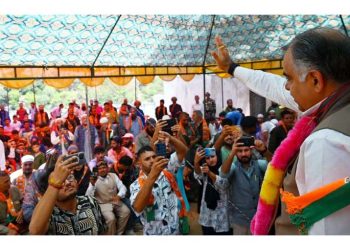Today, the Supreme Court rejected a plea brought by Ashwini Kumar Upadhyay, a BJP leader, to change the names of cities and historical sites that are believed to be named after “invaders.” Upadhyay wanted to establish a “renaming commission” to identify the original names of “ancient historical cultural religious places” that were named after “barbaric foreign invaders.”
𝗦𝗖 𝗾𝘂𝗲𝘀𝘁𝗶𝗼𝗻𝘀 𝘁𝗵𝗲 𝗶𝗻𝘁𝗲𝗻𝘁𝗶𝗼𝗻𝘀 𝗯𝗲𝗵𝗶𝗻𝗱 𝗣𝗜𝗟
The intention behind the PIL submitted by Ashwini Upadhyay was questioned by Justices KM Joseph and BV Nagarathna, who expressed concern that it would revive problems “which would keep the country on the boil.”
In its ruling, the bench stated that the country’s history should not haunt its present and future generations.
𝗧𝗵𝗲𝗿𝗲’𝘀 𝗻𝗼 𝗯𝗶𝗴𝗼𝘁𝗿𝘆 𝗶𝗻 𝗛𝗶𝗻𝗱𝘂𝗶𝘀𝗺: 𝗦𝗖
The Supreme Court, coming down heavily on the petitioner, said: “Hinduism is not a religion but a way of life. Hinduism is a way of life and there is no bigotry in Hinduism. Don’t dig up the past which will only create disharmony. Can’t have the country on the boil.”
𝗣𝗲𝘁𝗶𝘁𝗶𝗼𝗻𝗲𝗿 𝗵𝗮𝗱 𝗿𝗲𝗾𝘂𝗲𝘀𝘁𝗲𝗱 𝘁𝗼 𝗲𝘀𝘁𝗮𝗯𝗹𝗶𝘀𝗵 ‘𝗿𝗲𝗻𝗮𝗺𝗶𝗻𝗴 𝗰𝗼𝗺𝗺𝗶𝘀𝗶𝗼𝗻’
In his petition, Upadhyay requested that the government establish a “renaming commission” to reinstate the “original” names of ancient historical, cultural, and religious sites that were “renamed” by foreign invaders.
According to the petition, even though the Mughal Garden was recently renamed Amrit Udyan, the government failed to rename roads that were named after invaders. The petition argued that retaining these names violates the sovereignty and other civil rights protected under the Constitution.




































